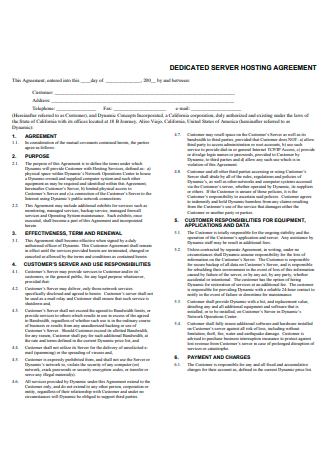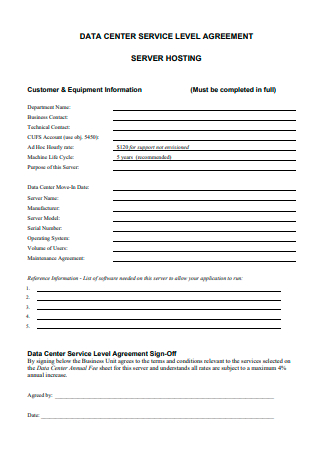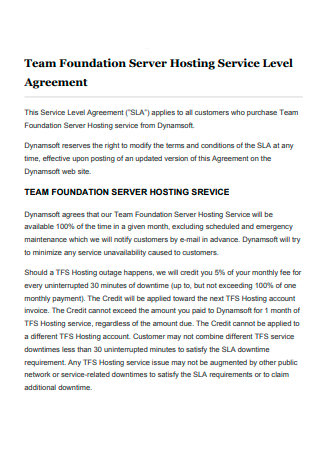4+ SAMPLE Server Hosting Agreement
What Is Server Hosting?
Server hosting is an IT service, often provided by a cloud service provider, that gives remote permits to off-premises virtual or physical servers and associated resources for a monthly subscription or cost-per-use basis. Server hosting enables IT teams to deploy and begin utilizing application and data servers without the expense, time, and labor of purchasing, installing, operating, and maintaining actual server hardware on-site. In 2021, dedicated hosting accounted for 25.5% of the global market for web hosting services. Dedicated hosting is anticipated to increase at an 11.1% CAGR between 2021 and 2026.
Benefits of Professional Web Hosting
Creating a website is essential to the online presence of every organization. However, the procedure is more complex than many may believe. Before you contemplate the ideal online design, you must decide which web hosting platform to employ. It would help if you had a competent web hosting plan to keep up with your website today. Regardless of the industry in which your business operates, a competent web hosting solution is essential for a solid online presence. Here are a few advantages only professional platforms can offer enterprises.
Types of Web Hosting
The distinctions between hosting plans extend far beyond hardware and money. In certain cases, for instance, complete hosting services are created around specific platforms like WordPress. In light of this, let’s examine the seven most prevalent forms of web hosting so you can make an informed decision.
1. Shared Hosting
Shared hosting is the most popular choice for website owners. Multiple users share a single server under this type of agreement. Thus, a single machine (a shared server) can host dozens, if not hundreds, of websites. You will share resources with other users, but you will not have access to their files, private information, or other data. The benefit of shared plans is that they are typically inexpensive, as hosting providers may spread server maintenance costs among numerous customers.
2. Virtual Private Server Hosting
Virtual Private Servers (VPSs) are superior to shared hosting plans in terms of performance and flexibility. A VPS operates by partitioning a single physical server into many virtually partitioned pieces. Each container, or virtual private server, is a complete system dedicated to your website alone. So you receive dedicated resources and, sometimes, access to the server’s configuration. In practice, VPSs give a higher level of user isolation, despite users continuing to share the same physical server.
3. Cloud Hosting
Cloud hosting is where things become more complicated. When people refer to the “cloud,” they typically mean distributed VPSs. Instead of storing a virtual server on a single computer, it is hosted over an entire network of computers. We refer to this network of computers as the “cloud.” You can quickly increase or decrease the server’s resources with a network. In addition, cloud hosting rarely experiences downtime or data loss due to the system’s built-in redundancy.
4. Dedicated Hosting
So far, we’ve discussed hosting options in which servers are shared with other customers. Private servers are more expensive than shared ones. You can access a single server exclusively (or sometimes more than one) with a dedicated server. Therefore, you will have complete control over its settings, and the web hosting provider will provide storage space. Regarding web hosting, dedicated servers are the premium option. At this level, expect to pay a minimum of $100 per month, and rates will only increase from there.
5. Managed Hosting
Managed hosting is distinct. It is a type of service, not a type of plan. With managed hosting, your provider handles a significant portion of the daily maintenance duties that you would otherwise be responsible for. Among these chores are backups, security monitoring, and software upgrades. It is essential to recognize that managed hosting services come in various flavors. There are managed shared plans, VPSs, and even collected dedicated servers. In each of these circumstances, you pay extra to focus on expanding your blog, portfolio, or e-commerce website without worrying about the technical aspects of hosting.
How to Choose the Right Web Hosting Company
Most business owners recognize the necessity of producing high-quality web content and designing a responsive corporate website. However, the process of choosing a dependable web hosting firm needs to be more noticed and appreciated. The following advice will assist business owners in selecting the best web host for their company’s website. Following these measures will prevent errors that could cause significant problems for your business in the future. Consider the top website builders and design services to create your business’s most excellent possible website.
1. Determine the type of web host you require.
Understanding the requirements of your organization helps in narrowing your web hosting options. Suppose you intend to construct a website with video blogging, 24-hour live streaming, and the opportunity for users to register and contribute their films. In that case, your website will require more features than a virtual résumé. Websites that receive daily traffic are unlikely to perform efficiently on a shared web server. These servers are intended to accommodate many small websites with minimal requirements.
2. Choose the right hosting package.
Many small businesses use shared hosting to save money, but with the lower cost comes a greater risk of sluggish website performance. This is typically the result of increased traffic on a server with restricted bandwidth. Slow websites drive people away and can be extremely costly. A virtual private server (VPS) solution is marginally more expensive but offers faster, higher-quality online performance and a superior customer experience. Hosting on a virtual remote server is a more efficient alternative for larger websites with higher anticipated traffic.
3. Read evaluations of web hosting services.
When investigating the dependability and reputation of web hosting, consult respected sources. Researching a web hosting firm via third-party evaluations helps identify any recurring difficulties or complaints from current and former customers. Pay close attention to the company’s response to concerns if it responds. This will provide insight into how the hosting company handles dissatisfied consumers.
4. Instead of focusing on price, read the terms of service.
It may be pleasing to join up with the cheapest web hosting company when you are a new business owner with a limited budget. As trite as it may sound, remember that you get what you pay for. The lowest price may be accompanied by sluggish servers, lousy customer support, regular outage, or affiliation with tens of thousands of substandard websites.
5. Test the customer service and Know the contingency plan.
Always look for a means to contact customer service while investigating web hosting businesses. Can you quickly get them by email, chat, or phone? If yes, then fantastic. Test each support function before purchasing any services to determine if they match your organization’s requirements. It would be best to determine whether the web hosting company you’re working with has a backup plan to assist you in a disaster. Consider the amount of time required to design your entire website. Determine how potential web hosts handle the worst-case scenarios during your research.
6. Avoid the new guy who can’t handle growth.
New web host firms frequently offer inexpensive costs in the hopes of attracting a large number of customers. However, most new hosting firms are not suited to manage that many clients simultaneously effectively. It is advisable to remain with an established company that can handle development without compromising customer satisfaction. Your web host offers your firm a virtual storefront. It will help if you choose a virtual storefront with the same care as a traditional one.
FAQs
What is web hosting vs. web server?
A web server is a computer that is used to run websites. Hosting a website on a server is what web hosting is all about. It holds one or more websites and is used to host them. It lets users get to a website through the internet.
Can I host my website?
If you have the time, you can host your website if you wish to avoid employing a professional. If you’re technically skilled, you will only need a little to host your website, and the process is pretty straightforward.
Can I host a website for free?
Yes, there are numerous media where you can host your website for free; you only need to select the most appropriate one. Before proceeding, let’s get a brief overview of Web Hosting. Web Hosting is the service that provides disk space on a server for your website.
Some organizations exist to promote specific causes and beliefs. However, it is difficult for philanthropic groups to raise finances for their advocacy because most rely primarily on charitable donations. However, with the assistance of technology and social media, they can reach out to more individuals for support. This agreement establishes the terms and conditions for using a site purely to perform a fundraising transaction by a third-party vendor and not for commercial purposes.





